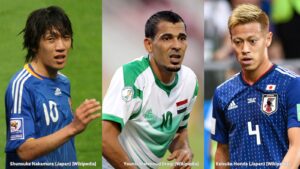
The 2023 AFC Asian Cup kicks off in Doha on January 12. From South Korea’s Son Heung-min and Kim Min-jae to Japan’s Wataru Endo and Daizen Maeda, there will be plenty of high-profile names on view in Qatar. Here, we look at some of those who illuminated earlier editions of the competition. Part one can be read here.
Also Read: The Israeli Trailblazer, Arabian Jewel and Ageless Kazu – Asian Cup Heroes
Shunsuke Nakamura (Japan)
Nakamura played his first game for Japan not long after the Blue Samurai had made it to their first World Cup in France in 1998. By then, his left foot was already catching the eye of Europe’s talent scouts. At the Asian Cup in Lebanon in 2000, Nakamura started every game as a rampant Japan cut a swathe through the tournament. They won it while scoring 21 goals (six matches) and conceding only six. That included 4-1 and 8-1 demolitions of Saudi Arabia and Uzbekistan in the group stage, and a 4-1 hammering of Iraq in the quarterfinal. Nakamura didn’t score with that wondrous left foot, but his passing and artistry in midfield earned him a spot in the team of the tournament.
Four years later, under a coach, Zico, who valued his skills far more than Phillipe Troussier had, Nakamura took centre stage in Japan’s title defence. He scored against Oman and Thailand, and it was his intelligent prompting that was crucial in nerve-wracking victories over Jordan (penalty shootout) and Bahrain (extra time). China, the hosts, were beaten 3-1 in the final. This time, Nakamura wasn’t just part of the team of the tournament – he was named its Most Valuable Player.
Younis Mahmoud (Iraq)
One of the reasons we watch sport in such large numbers is for the Cinderella stories, the narratives that almost defy belief – India beating West Indies in the cricket World Cup final in 1983, an unseeded Boris Becker boom-booming his way to the Wimbledon title, and Surinam’s Anthony Nesty touching the pool wall a fingertip ahead of Matt Biondi, to name just three. Asian football provided such a story in 2007. That Iraq even sent a team to the tournament was a minor miracle, given the post-war disarray in the country. In the group stage, either side of draws against Thailand and Oman, Iraq upset the highly fancied Australia 3-1, with Nashat Akram pulling the strings in midfield.
Mahmoud, who had scored the equaliser against Thailand, then came into his own, scoring in each half of the quarterfinal against Vietnam. A doughty defensive effort, and four perfect penalties in the shootout, then saw off mighty South Korea in the semifinal, to set up a final date with Saudi Arabia. Emotions ran high in the stands in Jakarta, given the fraught political relations between the two nations, and a tight, cagey game was settled by Mahmoud’s goal in the 72nd minute. Three years earlier, Greece had upset the odds to win Euro 2004. If anything, Iraq’s triumph was even more praiseworthy.
For the Latest Sports News: Click Here
Keisuke Honda (Japan)
With his peroxide-blonde hair and clever playmaking skills from midfield, Honda was in every sense the heir to Hidetoshi Nakata, whose time with Roma in Serie A at the turn of the millennium had done so much to raise Asian football’s profile. But, if anything, Honda was an even better goal-scorer, capable of stunning strikes from distance. He scored in three consecutive World Cups from 2010, and his Cruyff turn to set up the third goal in a famous 3-1 win over Denmark (2010) has a special place in most World Cup highlights reels.
In 2011, Japan went to Qatar seeking a fourth Asian Cup in six tournaments. The Nakata-Nakamura generation had given way, and Honda was very much at the heart of the side. They started slowly, needing a last-gasp equaliser against Jordan before Honda’s late penalty earned a narrow 2-1 win against a determined Syria. But that win seemed to spark the team to life, and Saudi Arabia were destroyed 5-0 in the final group game as Honda and friends overran them in midfield. Japan twice came from behind to beat Qatar, the hosts, in the quarterfinal, but it was the last-four clash against South Korea that was the game of the tournament. Honda missed a penalty in regulation time, but after Hwang Jae-won’s goals in the final seconds of extra time took the game to a shootout after a 2-2 draw, the Japanese talisman’s mental strength was on view as he put away the first kick. South Korea missed with all three of theirs, and Japan were through to another final. They would need extra time again, against an Australian side that had annihilated Uzbekistan 6-0 in the semi. Tadanari Lee’s goal settled it, and though Honda didn’t find the net, he was a popular choice as player of the tournament.




